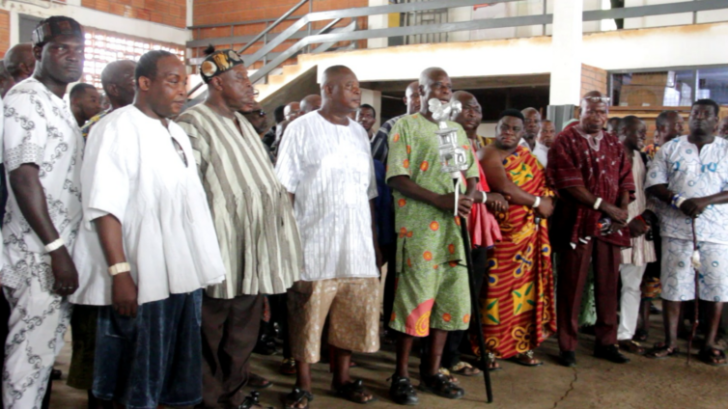
Ada Traditional Council condemns attack on Electrochem
The Ada Traditional Council has raised concerns over rising tensions in the Ada Traditional Area, warning that political interference and recent attacks on Electrochem Ghana Limited pose a threat to the future of the local salt industry.
The concerns arise amidst a history of disputes over the Songor Lagoon, a vital resource for the Ada salt industry. For years, the lagoon has been a focal point of conflicts involving access, ownership, and control.
Electrochem which manages the lagoon under a 15-year lease agreement, has faced opposition from some community members who claim there was insufficient consultation and argue they have been deprived of their ancestral heritage.
Speaking at a press conference on Monday, January 13, 2025, the Chief of Ada, Nene Abram Kabu Akuaku III condemned the disturbances, which he said have disrupted the company’s operations and placed the livelihoods of residents at risk.
The Council accused certain members of the National Democratic Congress (NDC) of inciting the violence. It alleged that some local NDC executives, led the group that stormed Electrochem’s premises on January 8, 2025.
Workers were reportedly forced out, and assets were looted during the attack.
The Council also referenced claims by the MP for Ada, Comfort D. Ghansah, who allegedly defended the perpetrators and vowed to secure their release from custody.
“These actions are deeply troubling,” Nene Akuaku said, warning that they could undermine investor confidence and derail planned expansions in the salt industry.
He noted that Electrochem’s operations are key to achieving production targets of two million metric tonnes in the short term and five million in the long term.
Electrochem Ghana Limited, which operates under a 15-year lease ratified by Parliament, has faced controversy since taking over the Songor Lagoon for large-scale salt mining.
Despite the disputes, the Traditional Council defended the company, highlighting its contributions to the community. These include allocating 2,000 acres of land for local salt production and infrastructure development, surpassing the 647 acres outlined in the project’s master plan.
The Council also dismissed claims that Electrochem had desecrated traditional sites. Instead, it credited the company with reviving salt crystallisation in areas of the lagoon that had been dormant for years, benefiting the local population.
Calling for urgent intervention, the Council urged the government to extend the same level of security to Electrochem as is provided to mining companies such as AngloGold Ashanti and Newmont.
“We cannot allow lawlessness and impunity to destroy the transformative gains made after 40 years of neglect,” Nene Akuaku stated.
The Council further called on law enforcement to prosecute those responsible for the attacks, emphasising that such actions should serve as a deterrent to others.
It also urged the NDC leadership to clarify the alleged involvement of its members, asking the party to either confirm or deny the claims.
The Council reaffirmed its commitment to fostering sustainable development in the area while cautioning against actions that could undo decades of progress in the salt industry.
